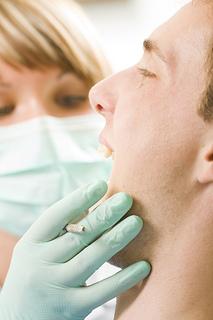I’ve lost a filling; now what?
- posted: Apr. 23, 2024
Dental fillings usually protect our teeth, but sometimes they need to be protected, too. If you lose a filling, contact our Grand Blanc, Michigan office immediately and let us advise Read More
Losing a Baby Tooth
- posted: Apr. 09, 2024
It seems like yesterday. There you were, comforting your baby through sleepless nights, soothing her with a dentist-approved teether, celebrating as that first tiny tooth poked through her gums. And Read More
Oral Cancer Awareness Month
- posted: Apr. 02, 2024
Happy Oral Cancer Awareness Month! We know oral cancer can be kind of a scary topic, but it’s worth using this opportunity to learn about the disease and spread knowledge Read More
What is a crown?
- posted: Mar. 26, 2024
the doctor and our team at Debra A. Chinonis, DDS hear this question all the time. Millions of people have dental crowns that artificially restore the chewing surface of a Read More
Could a Night Guard Be the Answer to Your Dreams?
- posted: Mar. 19, 2024
Have you been having trouble getting a good night’s rest? Sometimes the reason for a poor night’s sleep is obvious. A midnight horror movie. A bedtime espresso. That anchovy and pineapple Read More
Going Green for St. Patrick’s Day?
- posted: Mar. 12, 2024
Happily for all of us who like to celebrate with friends and family, there’s no need to be Irish to enjoy St. Patrick’s Day. Every March 17th, many of us Read More
Good Nutrition Leads to Healthy Mouths
- posted: Mar. 05, 2024
At Debra A. Chinonis, DDS, we know the most common oral health diseases are tooth decay and periodontal disease (or gum disease), and both are among the easiest to prevent. Read More
Fluoride Use in Adolescents
- posted: Feb. 27, 2024
Fluoride is a mineral that plays an essential role in oral health. In fact, the significant reduction in American tooth decay in recent decades can be attributed to a greater Read More
Valentine's Day History
- posted: Feb. 13, 2024
Valentine’s Day is best known as a celebration of love in all its forms. Pink hearts, red roses, and cute greeting cards adorn every surface you see. What many people Read More
Make Brushing Teeth Fun!
- posted: Feb. 06, 2024
It’s understandable that kids would rather be playing outside or watching their favorite movie instead of doing a “boring” task like brushing their teeth. But there are ways to make Read More
Breaking Bad Oral Habits
- posted: Jan. 30, 2024
The effects of bad oral habits are something our team sees all too often. You might have bad oral habits that stem from childhood, possibly because your parents did not Read More
Easing the Teething Blues
- posted: Jan. 23, 2024
Every moment of your baby’s first year of life is precious, since every day your child grows a little, develops new skills, and discovers new things. Most of it is Read More
Oral Cancer Facts and Figures
- posted: Jan. 16, 2024
Oral cancer is largely viewed as a disease that affects those over the age of 40, but it can affect all ages, even non-tobacco and alcohol users. Oral cancer can Read More
How do I pick the right toothpaste for my needs?
- posted: Jan. 09, 2024
With so many toothpastes available in so many price ranges, it can be difficult to be sure you are selecting the right one for your needs. You need a product Read More
Tooth Protection and Winter Sports
- posted: Jan. 02, 2024
Just because it’s cold out there doesn’t mean you’ll give up keeping fit and active! Winter is the season for some of our favorite team sporting activities, and when you’re Read More
Call Today (810) 695-5226
Debra A. Chinonis, DDS
G-6111 S. Saginaw St.
Grand Blanc, MI 48439















